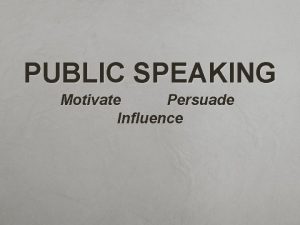Persuasive Speech Speaking out to persuade others From
















- Slides: 16


Persuasive Speech Speaking out to persuade others. . . From Reading to Writing Martin Luther King, Jr. ’s powerful “I Have a Dream” speech helped convince Congress to pass landmark civil rights legislation. It also continues to influence people of all ages to believe in and work to achieve their personal dreams.

Persuasive Speech Speaking out to persuade others. . . Persuasive speeches such as Dr. King’s can move listeners to tears and inspire them to move mountains. Politicians, advertisers, and businesspeople—and those students who want more input into school policy, later curfews, or a bigger allowance—all use persuasive speeches to help them reach their goals.

Basics in a Box GUIDELINES & STANDARDS Persuasive Speech Content A successful persuasive speech should • open with a clear statement of the issue and your opinion • show clear reasoning • be geared to the audience you’re trying to persuade • include strategies such as frequent summaries to help listeners remember your message • provide facts, examples, statistics, and reasons to support your opinion • end with a strong restatement of your opinion or a call to action • answer opposing views Delivery A successful presenter should • convey enthusiasm and confidence • stand with good, but relaxed, posture and make eye contact with the audience • include gestures and body language to enhance the presentation • incorporate visual aids effectively

Writing and Delivering Your Persuasive Speech 1 Planning and Drafting To find topic ideas for your speech: n Make a list of things you feel strongly about. n Brainstorm with friends about issues that you often debate. After you find a topic that you’d like to develop into a speech, follow these steps.

Steps for Planning and Drafting Your Speech 1. Clarify your position. How do you feel about the issue and why? 2. Find support for your position. What research will you have to do to back up your case? Where can you find that information? Which evidence will help you make your point most effectively? 3. Identify your audience. What do your listeners already know about the issue? What is their stand on it?

Steps for Planning and Drafting Your Speech 4. Consider how to grab your listeners’ attention. What startling statistics, amusing anecdotes, or intriguing questions can you use to hook your audience at the beginning? 5. Decide how to present your arguments? How can you organize your arguments so they have the greatest impact? Do you want to begin with the argument your audience will probably agree with and move to more controversial points? Would starting with the strongest argument—or ending with it—work better?

Writing and Delivering Your Persuasive Speech 1 Planning and Drafting Think about how you will present your speech. What verbal and nonverbal techniques will work best to capture and maintain your audience’s interest and attention?

Writing and Delivering Your Persuasive Speech 2 Practicing and Delivering n The best way to practice your speech is to present it aloud—again and again. n Try speaking in front of a mirror so you can evaluate and improve your posture, gestures, eye contact, and use of visual aids. n You might tape-record a practice session so you can critique your voice quality and effectiveness.

Steps for Delivering Your Speech 1. Use your voice effectively. Speak loudly enough to be heard, but vary your pitch and tone. 2. Maintain eye contact. Look directly at a member of the audience while you speak, moving your eyes from person to person.

Steps for Delivering Your Speech 3. Incorporate gestures and facial expressions. Let your emotions show in your face—particularly in your eyes and mouth. 4. Use visual aids. Organize your information into charts, graphs, or drawings that will reinforce your message. Make sure your materials are large enough and clear enough that everyone in the audience can read them.

Writing and Delivering Your Persuasive Speech 3 Revising TARGET SKILL RESPONDING TO AUDIENCE FEEDBACK A persuasive speech is successful only if it convinces your audience. Here are some comments peer reviewers might make and ways you can respond.

Writing and Delivering Your Persuasive Speech 3 Revising TARGET SKILL RESPONDING TO AUDIENCE FEEDBACK n I couldn’t remember the points you made. Include frequent summaries and reminders such as “I’ve just shown that you should believe X for reason A. My second reason for believing X is. . ”

Writing and Delivering Your Persuasive Speech 3 Revising TARGET SKILL RESPONDING TO AUDIENCE FEEDBACK n I couldn’t hear you. Speak loudly, but don’t shout. Be sure to vary your volume and tone. Try to speak clearly and not too quickly.

Writing and Delivering Your Persuasive Speech 3 Revising TARGET SKILL RESPONDING TO AUDIENCE FEEDBACK n Your evidence didn’t convince me. Gather additional expert opinions, facts, statistics, and examples; reorganize your arguments; check your reasoning.

Writing and Delivering Your Persuasive Speech 3 Revising TARGET SKILL RESPONDING TO AUDIENCE FEEDBACK n I was bored. Include an interesting quotation or personal anecdote; change the pace and volume of your voice; move around the room.
 Persuasive vs informative speech
Persuasive vs informative speech Persuasive vs informative
Persuasive vs informative One direction metaphors
One direction metaphors Chapter 16 speaking to persuade
Chapter 16 speaking to persuade Rhetoric: the art of persuasive writing and public speaking
Rhetoric: the art of persuasive writing and public speaking Value persuasive speech
Value persuasive speech The art of speaking or writing effectively
The art of speaking or writing effectively Persuasive speech meaning
Persuasive speech meaning Persuasive speaking definition
Persuasive speaking definition We look out for each other
We look out for each other Persuade reported speech
Persuade reported speech Reported speech persuade
Reported speech persuade What is a good research question?
What is a good research question? Say again persuasive techniques
Say again persuasive techniques Persuasive speech conclusion
Persuasive speech conclusion Problem solution persuasive speech topics
Problem solution persuasive speech topics Informative vs persuasive speech
Informative vs persuasive speech






























